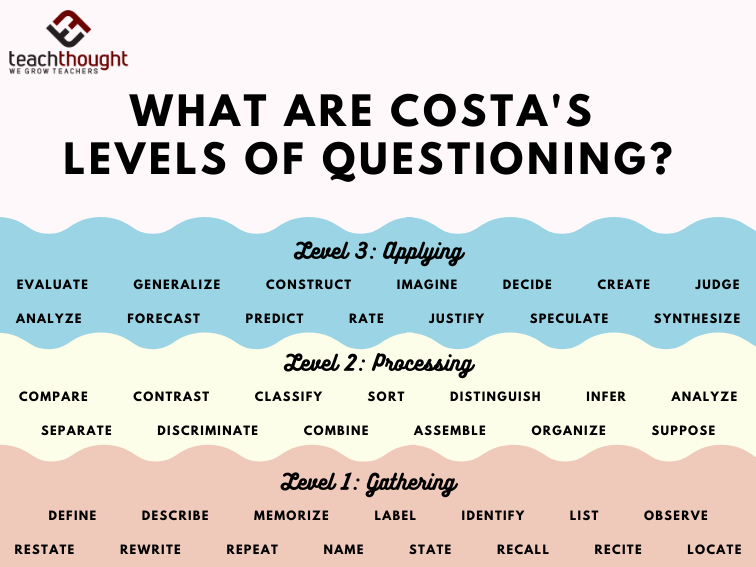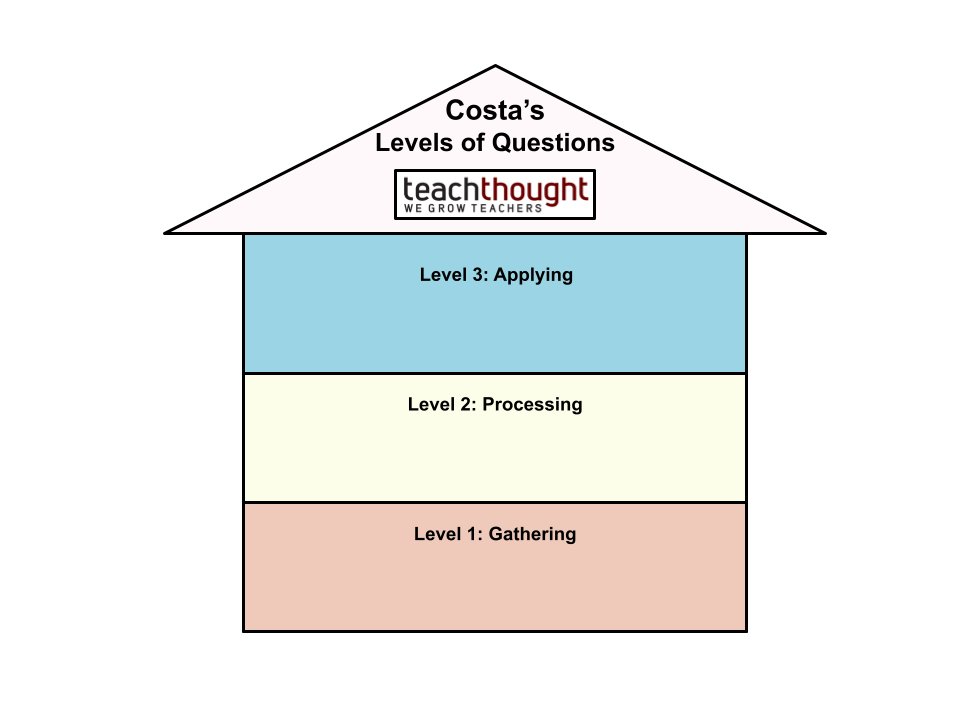

Costa’s Degrees of Questioning– designed by instructional scientist Art Costa– feature three tiers of examining created to promote higher-level reasoning and query.
Similar to Flower’s taxonomy , Costa’s reduced level motivates pupils to make use of more standard professors; as students go up in degrees, the questions motivate them to utilize even more complicated reasoning skills. Via years of research on human durability, Dr. Costa likewise determined the 16 Practices of Mind , a collection of habits that sustain students in browsing the challenges that commonly take place in school and life, in general. Numerous of Dr. Costa’s 16 habits– assuming interdependently, introducing, collecting information, and using previous expertise to new circumstances– both require and enhance greater levels of doubting.
There is a substantive quantity of research study that sustains Dr. Costa’s schema. Newmann (1993 found that higher-order thinking compels students to “manipulate information and ideas in manner ins which transform their significance,” and “anticipates trainees to solve problems and establish indicating for themselves,” which straightens with a constructivist view of education
Costa’s Levels of Examining are generally illustrated making use of the allegory of a residence with 3 floorings:


Level 1: Gathering
Level 1 concerns generally require students to work with information ‘on the page.’ Solution to level 1 concerns are normally literal; significance, a student can actually indicate the response on a page.
We’ve previously discussed Flower’s Taxonomy power verbs , so you can forecast that Costa’s levels have their own collection of power verbs, too. Below are a couple of that you may find at the start of Degree 1 questions:
- Specify
- Define
- Memorize
- Label
- Recognize
- List
- Observe
- Restate
- Rewrite
- Repeat
- Name
- State
- Remember
- State
- Locate
- Select
- Suit
- Program
Degree 1 concerns by material location could look like these examples:
- Scientific research : Tag the parts of a pet cell.
- Math : State the formula for locating the quantity of a cylinder.
- History : Suit the name of the queen to their particular nation.
- English Language Arts : Find the location in the plot where the orgasm takes place.
You can see exactly how the majority of these Degree 1 power verbs need pupils to recall details, which is an essential skill in its own right. Nonetheless, instructors ought to pursue the majority of their questions to drop in Degree 2 or 3, which test pupils to use higher-order thinking skills.
Degree 2: Processing
Degree 2 concerns go an action better than Degree 1, triggering pupils to process information by ‘analysis between the lines.’ While pupils may need to make use of actual information to create their actions, Degree 2 needs them to process that details with what they currently know in order to make brand-new connections.
Right here are some instances of Degree 2 power verbs:
- Contrast
- Contrast
- Classify
- Kind
- Distinguish
- Presume
- Assess
- Separate
- Discriminate
- Combine
- Assemble
- Organize
- Mean
Level 2 concerns by content location might show up in the following methods:
- Scientific research : Contrast the processes of mitosis and meiosis.
- Math : Classify the geometric shapes according to their number of sides and angles.
- History : Construct the complying with historic occasions in the order of significance, from many to least.
- English Language Arts : Analy ze the impact that the writer’s tone carries the overall meaning of the text.
Can you see exactly how Degree 2 questions go a step additionally than Degree 1 Greater than just throwing up information, students take it and ‘do something’ with it. They classify, make distinctions, and compare/contrast it against one more component to see how it impacts the entire. These type of abilities can boost interest and develop a bridge to the concerns that truly create creative thinking and higher-level reasoning.
Level 3: Using
While Degree 1 concerns trigger trainees to collaborate with input, and Level 2 concerns test them to process that input in order to make new connections. Here, pupils take part in the highest-level thinking abilities to develop an output. This might result from making evaluations and analyses, testing solutions to different problems, or making predictions.
We’ve included some examples of Degree 3 power verbs listed below:
- Examine
- Generalise
- Construct
- Think of
- Choose
- Create
- Court
- Analyze
- Forecast
- If/then
- Anticipate
- Price
- Justify
- Hypothesize
- Manufacture
- Construct
- Hypothesize
Degree 3 concerns by content location may resemble the following:
- Science : Based on data from the last decade of cyclone activity in the southeast united state, forecast how the frequency of cyclone activity will certainly change in the following ten years.
- Math : Price the probability of a governmental candidate winning the election based on securing the selecting votes from the adhering to U.S. states: Florida, California, Virginia, New York City, Illinois.
- Social Studies : Develop a social compact that considers the impacts of globalization and technical improvement in the 21 st century.
- English Language Arts : Build a disagreement that protects or refutes necessary staff member inoculation policies in the United States.
Whether preparing for discussion-based tasks, project-based learning, or independent inquiry, teachers ought to aim to orient most of trainee reasoning and interaction at Degrees 2 and 3 Assessments that motivate students to remember fundamental realities (such as the day of a historic occasion, or the name of a writer, or the formula for an equation) do not truly evaluate trainees’ capacity to apply brand-new skills or information to brand-new contexts. A Level 2 or 3 inquiry would certainly test trainees to make connections with fundamental information. For example, instead of recalling a simple day, an extra flexible inquiry would ask trainees to forecast, based upon the time in history that a particular event happened, the possibility of it reoccuring, provided a comparable sociopolitical ambience. Along the same lines, as opposed to recalling the names of famous authors, an educator could challenge trainees to make a debate for exactly how an author would certainly discuss a specific contemporary issue.
In “A Speak to Educators,” James Baldwin defined the paradox of education: “As one starts to become conscious, one begins to examine the culture in which [they] are informed.” Level 2 (and mainly, level 3 questions intend to promote this type of reaction in trainees, to create them to tilt their heads, do double-takes, mention discrepancies, interfere with the status quo, recognize problems in existing organizations, and produce cutting-edge remedies for those imperfections. These are the concerns that motivate us to come up with even more inquiries, to consider our thinking, and to develop– both as people and cultures.